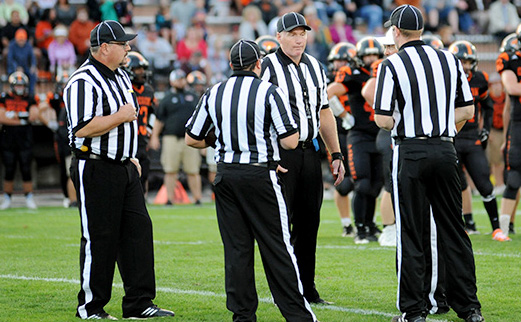Keeping coaches at your school
Ask any athletic director what makes their program so special, and most will talk about the coaches. They’re the ones on the ground floor, working day in and day out with the student-athletes.
That’s why it can be so devastating for a department when there’s constant turnover, providing little continuity and consistency within the programs.
One of the biggest challenges facing athletic directors is hiring and retaining coaches who have long-term plans for their respective teams. Sometimes it’s the salary, other times it’s the job, but regardless of the reasons, athletic administrators are searching for ways to keep coaches from fleeing their schools. “There are young, energetic coaches willing to do whatever they can to get into a school system,” said Kevin Flegner, athletic director at Arrowhead High School (Wisconsin). “But after a few years they often get married, start a family and find out the time commitment that’s really involved. They realize they can make more money teaching additional course loads or summer school than the small coaching stipend they receive for a full four-month commitment. You also have parental demands that are driving coaches out.”
“There are young, energetic coaches willing to do whatever they can to get into a school system,” said Kevin Flegner, athletic director at Arrowhead High School (Wisconsin). “But after a few years they often get married, start a family and find out the time commitment that’s really involved. They realize they can make more money teaching additional course loads or summer school than the small coaching stipend they receive for a full four-month commitment. You also have parental demands that are driving coaches out.”
Making a hire
There’s a variety of factors pushing coaches out the door, but that doesn’t mean athletic directors are helpless when it comes to slowing turnover.
It all starts during the interview, and asking the right questions can shed some light on a coach’s future ambitions. Maybe they plan to use your athletic program as a stepping stone to something bigger, or perhaps they’re rooted in the community and want nothing more than to grow their team into one of the best in the state. That’s why it makes sense to ask coaches about their philosophies and where they plan to go with their careers.
That doesn’t mean athletic administrators shouldn’t hire someone with great ambitions. Those are often the coaches most determined to do the best job, and that can create a solid foundation for the future of the program.
Flegner understands the value of a good hire, which is why he also likes to be involved when coaches bring on their assistants. Some schools give autonomy to their head coaches when building their staffs, but Flegner understands there is a lot at stake.
The thought is that assistant coaches should one day be in a position to run a program of their own.
“I want to know that we’re moving toward a likely succession plan,” Flegner said.
Constant support
Few things are more frustrating for coaches than having a department or supervisor that doesn’t support what they’re doing. At the same time, they seldom want constant oversight that gives the impression they’re not trusted to do their own jobs. There must be a balance.
“For us, it’s providing the resources that they need to be successful,” said Jim Inskeep, athletic director at Carmel High School (Indiana). “I don’t try to meddle in what they’re doing in their program, but I do try to lend a listening ear and give advice when asked.”
Coaches are more likely to stay with your program if they feel the school is invested, supportive and encouraging of what they’re doing. They also want to know that when things go awry — parents go on the attack or fans become overly critical — the athletic director is going to have their backs.
Inskeep talked about the value of being the first person to step up and provide encouragement for a coach who hits a rough patch, whether it’s on or off the field. Coaches are more inclined to fight for athletic directors who are willing to fight for them.
That also comes in the form of professional development. Rick Johns, athletic director at University School of Milwaukee (Wisconsin), does everything in his power to make sure coaches have the ability to attend clinics and conferences that help them grow in their profession. It’s even become a priority for him to find the funding to make it possible.
Support for coaches must be more than communicated. And if they feel like they’re respected and valued in your athletic program, it’ll make it that much harder for them to leave for another job, or leave the coaching profession all together.
Beyond winning
Coaches in some of the nation’s most successful high school athletic programs universally agree that winning is important. It just can’t be the top priority.
Coaches are always going to do whatever they can to win, but few like feeling that pressure from their supervisor. Education-based athletics are about teaching student-athletes important lessons that serve them well after they leave high school, and when winning becomes the focal point, other values get brushed aside.
Carmel High School is known for having one of Indiana’s top athletic programs, yet when coaches are asked what they enjoy most about being there, their response is related to the culture — not the championships. They don’t feel that they’re held to a win-or-get-fired standard, which allows them to focus on other aspects of the job, like developing positive character and teamwork.
“Every year I’m gunning for a state championship, and I would think that the (athletic director) would be looking for someone different if I weren’t, but knowing what it takes to get there, there are a lot of things that come into play,” said Emily Good, softball coach at Carmel High School.
“I love that challenge, and that’s what brings me back year to year, knowing that we have the ability to compete, and I know being a coach at Carmel is going to give me that opportunity.”
There are a number of things athletic directors can and should do to keep their coaches in place, and most of it comes down to support and appreciation for what they do. They should enjoy coming to work, and the second that they don’t is the moment they’ll begin looking for a new job.





